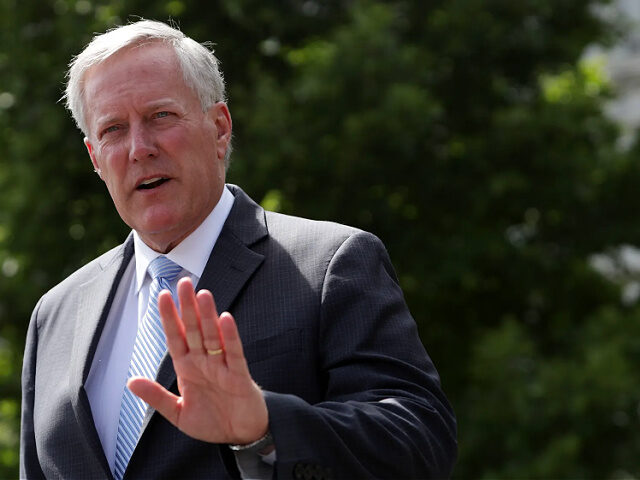Former White House Chief of Staff Mark Meadows filed a motion on Tuesday to remove the Fulton County, Georgia, indictment against him to federal court.
Meadows was charged with two counts in a 41-count indictment that named himself, former President Donald Trump, and 17 others. Meadows is being charged under Georgia’s RICO statute and faces charges for soliciting an official to violate their oath of office.
Fulton County District Attorney Fani Willis cites Meadows’ involvement in setting up calls between Trump and various state legislators as evidence of his violation of state law, conduct that primarily falls under the duties of chief of staff, as Meadows’ attorneys noted.

District Attorney Fani Willis holds a press conference in the Fulton County Government Center after a grand jury voted to indict former President Donald Trump and 18 others on August 14, 2023, in Atlanta, Georgia. (Photo by CHRISTIAN MONTERROSA/AFP via Getty Images)
For example, the indictment alleges:
On or about the 21st day of November 2020, MARK RANDALL MEADOWS sent a text message to United States Representative Scott Perry from Pennsylvania and stated, “Can you send me the number for the speaker and the leader of PA Legislature. POTUS wants to chat with them.”
…
On or about the 23rd day of December 2020, DONALD JOHN TRUMP placed a telephone call to Office of the Georgia Secretary of State Chief Investigator Frances Watson that had been previously arranged by MARK RANDALL MEADOWS. During the phone call, DONALD JOHN TRUMP falsely stated that he had won the November 3, 2020, presidential election in Georgia “by hundreds of thousands of votes’ and stated to Watson that ‘when the right answer comes out you’ll be praised.”
“Nothing Mr. Meadows is alleged in the indictment to have done is criminal per se,” Meadows’ attorneys George Terwilliger and Joseph Englert argued.
As the motion states:
Mr. Meadows has the right to remove this matter. The conduct giving rise to the charges in the indictment all occurred during his tenure and as part of his service as Chief of Staff. In these circumstances, federal law provides for prompt removal of a “criminal prosecution … commenced in a State court … against or directed to” a federal official, “in an official or individual capacity, for or relating to any act under color of [his] office.”
Nothing Mr. Meadows is alleged in the indictment to have done is criminal per se: arranging Oval Office meetings, contacting state officials on the President’s behalf, visiting a state government building, and setting up a phone call for the President. One would expect a Chief of Staff to the President of the United States to do these sorts of things. And they have far less to do with the interests of state law than, for example, murder charges that have been successfully removed.
Meadows’ attorneys relied on the Constitution’s Supremacy Clause, which establishes that the federal Constitution and federal law take precedence over state laws and constitutions.
“This is precisely the kind of state interference in a federal official’s duties that the Supremacy Clause of the U.S. Constitution prohibits, and that the removal statute shields against,” the motion states.
Meadows “intends to file a motion to dismiss the indictment” under federal court rules, according to his attorney.
“Defendant Meadows has defenses to the charges in this Georgia indictment that arise under federal law, including a federal immunity defense under the Supremacy Clause of the Federal Constitution,” the filing states.
Mike Davis of the Article III Project called on Trump to follow Meadows’ footsteps and remove the case to federal court and then move to dismiss the case citing “presidential immunity.”
President Trump should also remove the case to federal case.
And move to dismiss.
Presidential immunity.https://t.co/2qeTjnCf3y
— 🇺🇸 Mike Davis 🇺🇸 (@mrddmia) August 15, 2023
Following Meadows’ argument, Trump could also challenge the Georgia indictment on the grounds that it interferes with his exercise of presidential powers under the Electoral Count Act of 1887, whereby states are prohibited from interfering with a president asking about election fraud.
ABC News reported that Trump is “also expected to mount a similar effort,” citing sources familiar with the matter.
The case is Georgia v. Meadows, No. 1:23-cv-03621-SCJ in the United States District Court for the Northern District of Georgia.
Jordan Dixon-Hamilton is a reporter for Breitbart News. Write to him at jdixonhamilton@breitbart.com or follow him on Twitter.

COMMENTS
Please let us know if you're having issues with commenting.